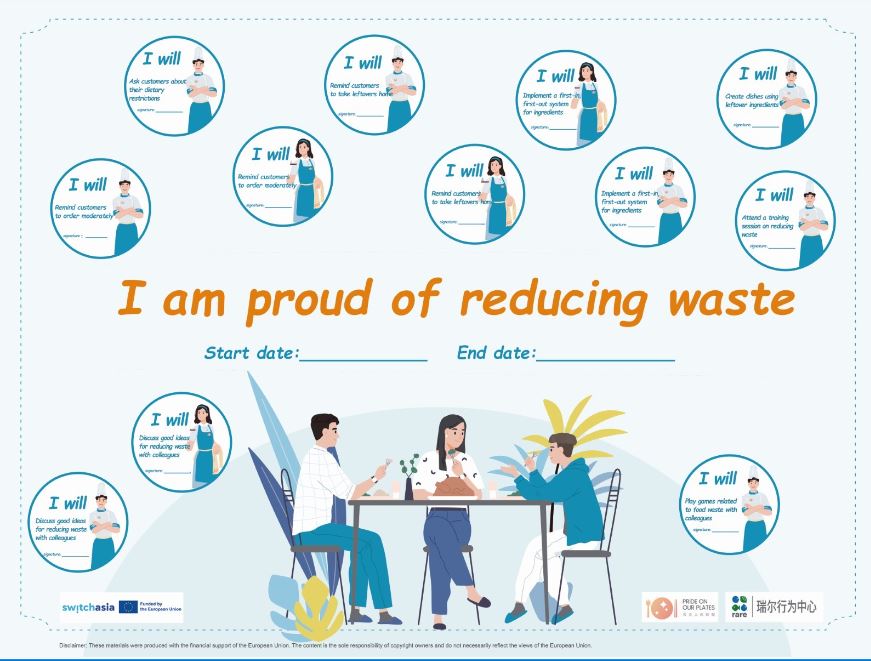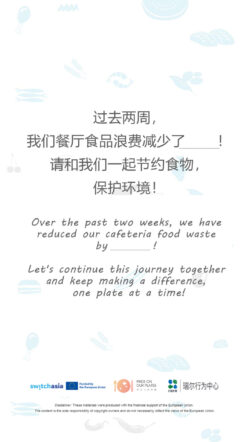According to the United Nations Food and Agriculture Organization, the world loses or wastes more than one-third of all food produced for human consumption. This loss of nearly 1.3 billion tons of food contributes to global food insecurity, land degradation, biodiversity loss, and human-induced greenhouse gas emissions.
In China, leaders are tackling the challenge of food security and working to reduce the nation’s food waste, which China’s National Food and Strategic Reserves Administration estimates to be 67.5 million tons of food annually. About half of China’s food loss occurs with retailers and consumers at the final production stage. Reducing food waste in China’s micro, small, and medium-sized enterprises (MSMEs) is one of the easiest and most effective ways to lower the country’s greenhouse gas emissions and improve food security.
Pride on our Plates
Rare China Center for Behavior and Rare Europe partnered with One Planet Foundation and the World Wildlife Fund for Nature Beijing to create Pride on our Plates. This initiative empowers China’s MSMEs to reduce food waste and encourage more sustainable consumption patterns. The project’s goals include training restaurant staff to decrease food waste, increasing consumer awareness, and creating an MSME Food Waste Policy Proposal that supports national, regional, and local governments in tackling food waste across China.
A key component of Pride on our Plates is applying Rare’s behavior-centered design approach, which blends design thinking and insights from behavioral and social sciences. Rare’s China team led project efforts to gain a deeper understanding of the current behaviors of MSME staff and owners, helping to inform program activities that would be developed throughout the project to tackle food waste.
Insights from Rare’s research
Early in the project, Rare discovered that over 54% of MSME owners believed their restaurant’s food waste was “less than average,” — but they had no data or monitoring plans to inform this assumption. Insights gained from these surveys and interviews highlighted a big problem: while most MSME staff (97%) thought reducing food loss and waste is very important, there was an ongoing assumption that food waste “isn’t really a problem at our restaurant.”
One of the first steps to shift this viewpoint was raising awareness of food waste by implementing a monitoring system requiring staff to weigh and record the different types of food waste (food spoilage, preparation waste, buffet waste, and plate waste).
Building a sense of staff accountability

Rare identified a need to engage all levels of staff to effectively adopt interventions that can support efforts to reduce food waste, as an enthusiastic individual boss is not enough. To ensure all staff felt responsible and accountable, Rare created a public commitment wall where staff pledged specific actions they would be held responsible for to reduce food waste.
Restaurants that adopted a public commitment wall had on average 63% of staff reporting that they had a very clear idea of actions that they could take to reduce food waste. At restaurants without a commitment wall, on average only 36% of staff reported having a very clear idea of what they should personally do to reduce food waste.
Reducing waste through targeted consumer messaging
Restaurants in China are introducing online ordering platforms, allowing customers to order directly from their tables by scanning a QR code. This emerging trend reduces demand for front-of-house staff, minimizes costs associated with printing and updating a physical menu, and opens new opportunities to reach customers through targeted messaging on online menus.
In partnership with Little Pear Restaurant, Rare incorporated messages into online menus and restaurant signage to prompt customers to order meals in moderation.

Messages appear before customers place their orders and emphasize how ordering reasonable portions positively reflects an individual’s character — a gradual social shift away from showing appreciation for guests by ordering an excess of dishes to share.
The message on the WeChat menu, “please join the commitment to clear your plate,” invites customers to commit to reducing plate waste after placing an order. Over four weeks, the restaurant saw a 48% reduction in plate waste per customer.
In addition to encouraging customers to order in moderation, messages also urged consumers to take leftover food home, leading to a 4% increase in customers requesting takeout boxes.
Further interventions introduced through the project to reduce food waste include:
- Behaviorally informed table stands
- Optimized menu designs to reduce excess waste
- Staff training videos on food waste reduction and behaviorally informed games
- New label designs for ingredient boxes


Next steps
The pilot program, scheduled to end in 2024, already has promising early data. Participating restaurants have seen an average 19.8% reduction in food waste compared to baseline data collected at the start of the pilot.
Rare is currently supporting 20 MSMEs across Beijing and Kunming by providing 1:1 advisory and support services, while also collecting real-time data on restaurants’ food waste reduction efforts.
Over the pilot, Rare has successfully cultivated connections with a network of industry associations and partners. These invaluable relationships have played a pivotal role in engaging with MSMEs, helping cement Rare China as a trusted voice within the industry.
With a proven method and toolkit of solutions, Rare is now looking to scale its work in tackling food waste to new cities across China, making a vital step towards achieving global and national food waste reduction targets.

This project is co-funded by the European Union. This webpage was created and maintained with the financial support of the European Union. Its contents are the sole responsibility of Rare and do not necessarily reflect the views of the European Union.